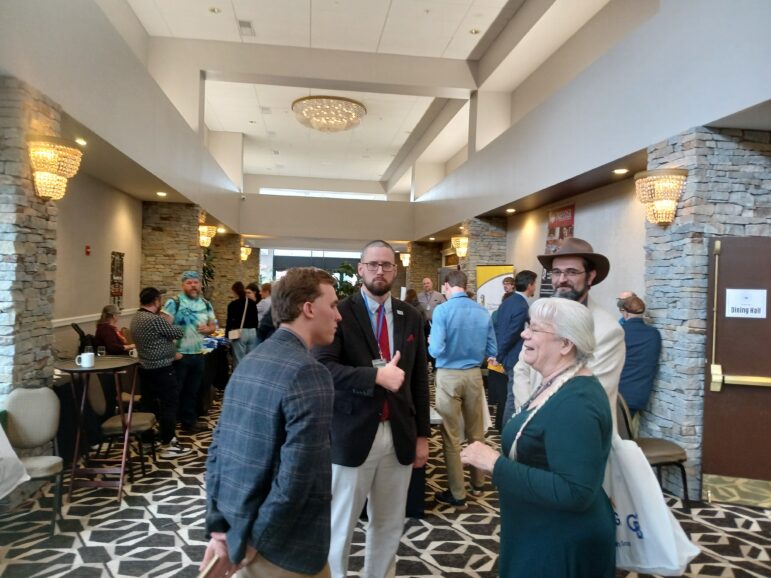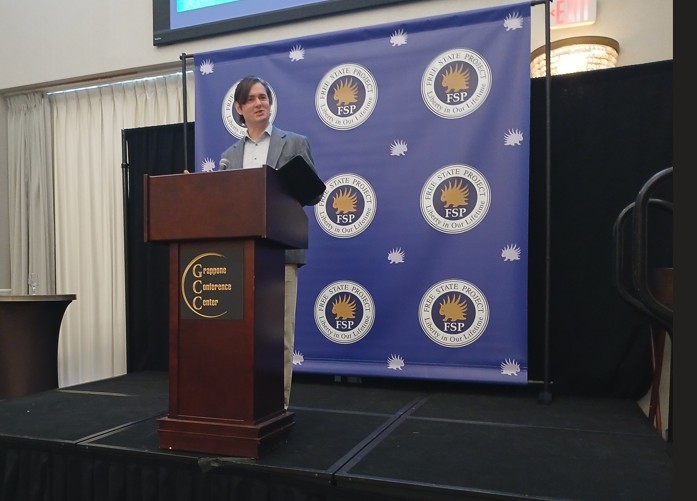
Above, Participants in the 2025 Liberty Forum gather for conversation during a break in activities at the Grappone Center in Concord Friday. RAY CARBONE photo
By RAY CARBONE, InDepthNH.org
CONCORD – Nearly 300 people gathered at the Grappone Conference Center here Friday for the start of the 2025 NH Liberty Forum. The annual two-day event, which concludes Saturday, is associated with the Free State Project (FSP), a movement that began 24 years ago.
The FSP aims to attract people with similar libertarian views to the Granite State to create a community of “freedom-loving” people who can advance their long-term political/social goals.
Friday’s activities kicked off with addresses by Eric Brakey, the executive director of the FSP, and Jason Sorens, who founded the movement back in 2001. Brakey resigned from the Maine Senate to relocate to New Hampshire late last year.
Shortly before the first session started, Brakey said that “thousands and thousands” of people have relocated to New Hampshire during the last 20 years as the result of the Free State Project.
Most come from other parts of New England or from New York, he said, but some have moved from as far away as California. Exact figures are difficult to calculate but Brakey estimates that between 3,000 and 7,000 current residents are FSP transplants.
When their number is added to the count of New Hampshire residents who support some or all of the FSP’s goals, it’s had a significant impact on the NH State Legislature.
Brakey said that one independent political organization estimates that almost 100 of New Hampshire’s 424 legislators are in sympathy with the issues and views of the libertarians, including: stronger local government, along with a lessening of the powers of the state and federal governments; openness to ideas associated with crypto currency; an increase in school choice; legalization of marijuana use; and other concerns the group considers to be restrictive of individual freedoms.
On the Liberty Forum online agenda, one man, Dennis Pratt proposed a solution to bringing more libertarians to New Hampshire: “The ‘Second Free Town Project’ proposes a tactical solution: concentrate ~50 committed liberty activists in one selected small town (~1,000-2,000 pop.).
“By integrating respectfully (‘Be a Good Neighbor’) and gaining planning board influence, this group can
achieve targeted zoning reform in a small area. The objective is enabling affordable starter homes, directly addressing the FSP’s primary recruitment/retention bottleneck. This requires strong leadership, a committed team, careful town selection, and disciplined, low-profile execution, learning from past failures, to provide a replicable model for accelerating liberty.”
Also mentioned on the agenda was a program Friday “Education Freedom Accounts-Seed Capital for Bright Futures” by New Hampshire Education Commissioner Frank Edelblut. It said: “When parents rose up during the COVID Era, Commissioner Edelblut worked with grassroots school choice leaders to establish Education Freedom Accounts (EFAs) — funding students, not systems, by putting state education dollars directly in the hands of families. (This model has been since replicated in many states across the country, further demonstrating the value of New Hampshire as a libertarian laboratory for policy innovation.)”
In his remarks, FSP founder Sorens touted the Granite State’s history as a bastion of limited government.
“New Hampshire is uniquely well suited for the prospering of libertarian ideas,” he said.
Carla Gericke, who is chair of the FSP’s board of directors and president emeritus of the group, said that she was first drawn to consider the ideas advanced by libertarianism after the high-tech bubble in California burst. “I’m an immigrant who moved here from South Africa, got my green card in 1996,” she said. After her husband’s West Coast tech job disappeared and her company folded, the couple began trying to understand what happened. That search led them to consider libertarian ideas and to connect with others who agreed with their observations.
“Look around you and you can tell that this is a bunch of nerds,” she said Friday. “These are really smart people who read a lot, and who were looking for solution-driven answers.” Now, the group hopes to share their ideas with others.
The forum continues Saturday.





